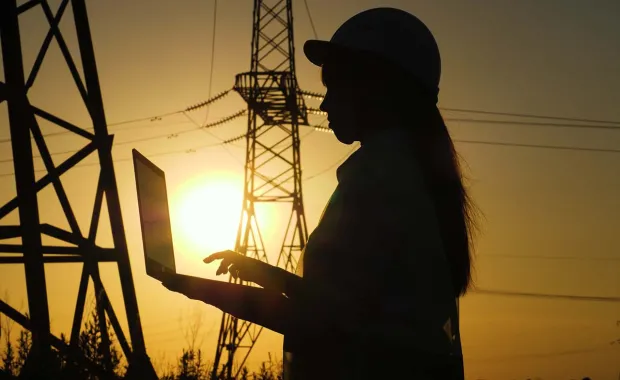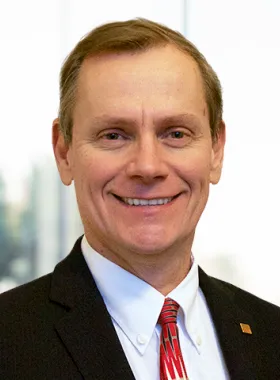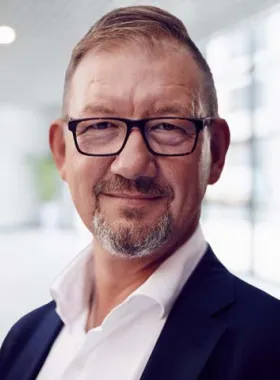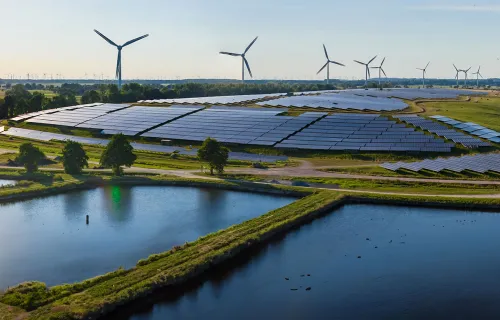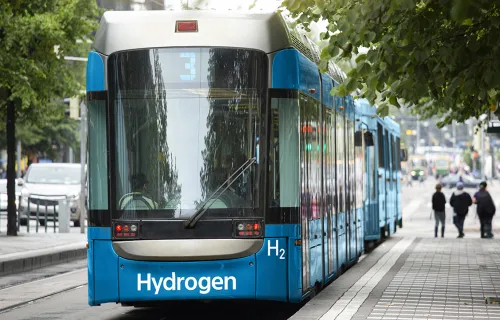This year’s Voice of Our Clients global research revealed that top macro trends facing organizations include the fight against climate change, investing in technology to accelerate digital transformation and addressing changing social demographics and shifts in the world economic order. Underpinning most executives’ strategies and solutions to address these challenges? Data.
However, Patrik Mardell highlights, data isn’t new; data has been a key focus in energy and utilities for decades. “You could say that the energy sector has been almost early adopters with data,” he says, “because you could not run energy production without good data. You cannot distribute power in cable and wires without good data.”
In Patrik’s view, what’s changing is the quality, timeliness and intelligent application of the data.
Peter Warren agrees: “When we asked where people were going to be investing over the next three years, not surprisingly, data management and governance and data quality were very high.”
So how is the industry using data and artificial intelligence (AI) to help digitize and optimize operations and accelerate the energy transition? Peter and Patrik discuss.
As industry and customer behavior evolves, and the demand for new technology solutions grows, data emerges as “the key source for making good decisions,” according to Patrik Mardell. “Not only keeping data, but collecting the right data and making sure to use it the right way.”
Peter agrees, highlighting quality data as the bedrock for any kind of AI or IoT work. Organizations’ key investments going forward in these areas, he says, are better intelligence for decision-making, automating more of their engineering, driving more data-based engineering insights and improving operations to streamline decision-making.
AI has been present in the industry a long time. According to Peter, “the key now is to look at different data sources and advance that automation…So, there’s the data I have, but also now with new tools, scraping data from other websites, scraping data from other components, looking at customer care and the desire to service customers differently.”
Patrik also sees rising customer engagement as a key driver behind organizations’ focus on better data and automation, identifying smart homes, vehicles and wearables as factors contributing to customers’ growing interest and expectations.
Peter agrees, referencing the rise of smart chatbots to support dynamic, data-driven decision-making for customers. As he explains, when energy pricing rose in regions around the world, there was an influx of intelligent chatbots to support call centers and help customers determine pricing.
This advancement in the use of AI for customer service underscores a key belief at CGI, Peter shares: “AI is all about making a smarter person more empowered to make the right decision.”
Patrik says even the conversation around energy storage has evolved to include everyday customers. “That discussion was not present two years ago. And now it's down to normal people with a little bit of technology interest. ‘How can I store and postpone the outtake and how can I supervise my own, let's say, usage of power?’”
The advancement of technology to empower everyday customers and optimize business operations often comes down to money, Patrik acknowledges, but he stresses that investment is the way forward.
“Investment needs to be done from a personal, private and financial situation into new technology, but also into the real estate investors and into the energy company. They have huge investments to be made. And we, as a company, are more than prepared, I would say, even more than prepared to support that kind of investment and help them.”
As pressures from net-zero targets increase, energy and utilities organizations are focused on digitizing, optimizing and protecting operations. In addition to advancing automation and digital transformation, Peter shares some key areas executives are prioritizing, based on CGI’s 2023 Voice of Our Clients data:
As Patrik concludes, change takes time, even in agile environments, but there is no time to wait. Strong decision-making is vital to prioritizing your actions to ensure you are taking steps now to advance your business goals and achieve net-zero targets.
- 1. Introduction
-
Peter Warren:
Hello everyone, welcome to another installment of our Energy Transition series. I'm Peter Warren. Just to remind you, I'm the Global Industry Lead for CGI here. My job is to help what we do around the world with our clients, bringing over 30 years’ experience in the energy and utility industry. As you all know—better than I do, because you're on the frontline in so much of this—we're going through a lot of changes and we're going to be discussing a few of those key points today.
Based on feedback from a Voice of Our Clients survey that we did this year, where we interviewed over 1,500 different clients in different industries and got some pretty good insights, rather radical insights in some cases, on changes in the industry and how things are moving forward. Today, my guest is Patrik. Patrik, over to you just to give a quick intro of yourself.
Patrik Mardell:
Okay. Thank you, Peter. I'm Patrik Mardell. I am the DCEE, Director Client Executive in Energy and Utilities, in the south of Sweden. I have spent the last 25 years working with companies like Aon and Fortum in the Nordics. I’ve been here for one year, doing my best to help customers cut lines across the Nordics to advance part of the transition needed.
- 2. Global trends from CGI’s Voice of Our Clients survey
-
Peter Warren:
Thanks. We love having people join from the industry, because we only know what we know and you come in with a whole new set of skills and insights, and we'll probe those today.
Just a bit of a background for the audience: this year's Voice of Our Clients program revealed a few major things from a macro trends perspective. So, fighting against climate change was a clear trend this year, certainly with the fires and events we've had in Canada and around the world, and the flooding—we see the cause and effect of what's going forward. Also, there's huge investment into technology to drive digital acceleration, and the changing social demographics that we're all facing; the difficulty of hiring staff and getting people was a key thing, as well. Regulations are constantly moving, and we'll talk about those today. And the shift in the world economic order, so impacts from both the war in the Ukraine, legacy issues with Brexit and even the ongoing things with China. It's definitely been a different year for us moving forward. But just kicking it off into the subjects here, what's your view, Patrik, of the trends that you see moving forward?
Patrik Mardell:
Well, if I look at it from a European perspective, which is my home territory, I would say that there is quite a rush at the moment. Everybody wants to do a lot of things at the same time. Industry is changing, customer behavior is changing, technology is getting more and more important and absolutely data. Data will be the key source for making decisions. Good data, good decisions, quite a normal combination. Not only keeping data, but collecting the right data and making sure to use it in the right way. And I think, to be honest, that the challenge at the moment can be prioritization, because at the end of the day, there are too many things to do and then you need to make some short lists and make decisions on what to start with and what to put on hold. That is one thing that I'm thinking. The second thing, coming back to your intro about the Voice of Our Clients is that the clients are also in a position where they are currently looking for very new competencies. There is a competence assurance issue across the industry. At the same time, the industry wants to keep the very well-educated and very experienced colleagues, but they also need to add on top of that new experience, new knowledge. And that is quite a challenge.
- 3. The growing importance of data management and governance
-
Peter Warren:
Yeah, I think that's a key component of what we're looking at is the changing demographics. You hit on the data once. Let’s explore that a little bit, from the data that we had from the Voice of Our Clients. When we asked where people were going to be investing over the next three years, not surprisingly, data management and governance and data quality were very high—well into the 80s, 86 and 84%, were saying these are the areas. And when we talk to our folks that do a lot of work in AI, as well as the IoT industry, you have to be standing on solid ground if you're going to be doing any kind of work. So, it's not surprising there. And the other big areas, the five key points of where they want to put it going forward, they want to do better intelligence and decision making. AI certainly fits into that. They want to automate more of their engineering. They want to drive more engineering insights. So, they're looking for better data. Machine learning fits into that, but also just better aspects of moving forward. They're also looking for better scenarios for managing their operations and just simply stuff to make decision-making cleaner. And I think in your experience, you've seen that as well in your past career and what you're working on today.
Patrik Mardell:
I think you're right. It's getting more and more interesting to discuss the data issue with the clients. You could say that the energy sector has been almost early adopters with data, because you could not run energy production without good data. You cannot distribute power in cable and wires without good data. Back in the 50s, 60s and 70s, already, data was quite a big thing in the industry. And we, who have been working for a long time in the energy sector, we've always said we are good with data. But now we can see new data coming up, because now there is the half hour limiter, there is the data based on customer behavior and the actual propensity to do things. How would you predict something to happen when people are putting solar PVs on the roof and having their electrical car charged at their home? And all these disturbances, or what you can call them, is interacting with the grid and with a system that was well-established for almost 100 years. So yes, we, and I'm talking as a person from the industry, we have always been fascinated in utilizing the data we have. But I think there is a new sheriff in town. There is new data that we need to put in combination with the old data to make sure that we work in an efficient way, and at the end of the day meet the big targets, climate targets, as well as other targets, I think. So, it's not an easy task, is it?
Peter Warren:
No, and I know that when I'm talking with folks in the industry, if there's no lack of data, it goes back to your earlier question about prioritization and things like, that is, there's almost too much data. And what do I do with it? And the whole aspect of having data quality, we just talked about, it's really knowing, and I love this quote from one of our folks, is having trusted data to do a trusted action. If you don't trust the data, you're not going to do the action. This is now picking up the pace and the concept of AI, which quite frankly, has been a long time in energy and utilities. We've used it from machine learning. We've used it from a variety of aspects, but it's now sort of the buzzword. I think what's now happening is, and you talked about this too, Patrik, is looking at different data sources. So, there's the data I have, but also now with new tools, scraping data from other websites, scraping data from other components, looking at customer care and the desire to service customers differently. How do you sort of see that evolving?
Patrik Mardell:
Well, you're absolutely up my alley because I was always, as an employee in the energy sector, I was working with a customer and the customer, both B2C and B2B customers. And the trend that I can see, and I would probably just repeat what everybody already knows, is that the engagement from the customer side is much higher, and it's driven by many factors. One of them can be the new smart products that you can wear like the iWatch or any phone or whatever tool you have in your home, smart home. This drives your engagement level and, of course, makes people much more interested. Then you have all of these smart vehicles, you have the electrified homes that is used to be only turning your light on, but all of a sudden you can do much more, much, much more. So, I think at the end of the day, there is a tough decision to be made and that is, how much are you willing to sacrifice from your own decision making? Let me put it in this way. I've been told that I should implement more technology in my home because I can learn and live according to price peaks and so on, on the power situation. But actually, I'm not prepared to do that. If I want to cook dinner at 6 p.m., I want to cook dinner. I have kids that are hungry, and I don't plan cooking, or maybe doing the washing or something like that, based only on electricity pricing. So, I think it's a difficult discussion to have, and it's also not so easy. Like I tried to say before, this has not happened before, Peter. This is things that are happening right now. And many of us, even we call ourselves experienced, are not experienced in this area.
- 4. Impacts of changing energy costs on the industry and consumer
-
Peter Warren:
I totally agree with you. I consider myself a bit of a geek and have done a smart home and different things like that. But the same thing comes along, when you want to do the dishes and you need to have them done because people are coming over, you're going to run the dishwasher. If it's in Canada, 43 cents, if I'm paying the highest rate, then it's 43 cents. That's what you pay. But that doesn't really help the curtailment thing. So, I think where we see within the DERMs, and you just sort of mentioned a whole thing about smart homes and stuff, DERMs has gotten very complicated. They talk about in the utility and outside the utility, and you've got all of the people that are doing consolidation of energy and doing curtailment as a service. This has really gotten beyond the point of just being a simple problem. But as an operator of the utility, all of those are now impacts to you. So, the grid itself, I know this is not truly your area of expertise, but from a customer service standpoint, how do you see all of that impacting through to the grid, these types of things you just sort of brought up a second ago?
Patrik Mardell:
Yeah, to be honest, I think that the problem that I see, and that is a bit of a mental problem because at the moment, at least in the Scandinavian market, prices are pretty low. So, after one year of extremely high pricing and engagement was, of course, high because everybody was upset with the fact that it was so expensive. And now you can see prices are going down and immediately energy as a topic of interest or energy as an engagement thing goes down. So, from a customer point of view or customer service point of view, I think we need to be more aware that these topics, or how can I put it, these utilities are a good word, right? If they are running smooth at the decent level of costs for a family of four, then I think we need to do other things. And for me personally, and that is maybe a bit of an example only, for me, engagement grew dramatically, even though I worked in the industry for 25 years, but as soon as I put solar PV on my roof and got myself an electrical car, all of a sudden this makes much, much more sense. And I think you, Peter, are the same with your technology in your home and stuff like that. But what if you live in a two-bedroom flat in the city center and you commute by bus or bike to your work and stuff like that? That might be a different story, then. And then, I think we need to talk to the real estate companies and help them as a client segment to develop and utilize all of the data what is actually available.
Peter Warren:
Yeah, it's a very interesting point you bring up because we're not all cookie cutter. We're not all living in a four-bedroom bungalow someplace. So, I think that that's an interesting one. Now certainly, we've applied a lot of smart chatbot to the influx of people calling. Certainly, when energy pricing rose in Germany and other places around the world, there was a huge influx. So, bringing in intelligent chat bot to help people work through what the pricing would be and offload. The call center was important to still provide service. But I think we can also look as an industry to what's happening in the insurance industry. So, in the insurance industry, when you call in and say, hey, I'm Patrik and I live here and this is what my family looks like, I'd like a better rate, what we're working on in that area is there's the core data they know. In other words, we talked about data quality before, there's rock solid data that they know and understand that they're going to build a rate for you on. But they also dynamically scrape what's happening for a person your age, of the family like yours, living where you live, and look at what their competition is doing, and can actually see what the rates are, and actually tailor a plan for you.
- 5. The future of AI in empowering customers and tailoring services
-
Peter Warren:
And now the AI. And this is one of the beliefs we have in AI and CGI, is that AI is all about making a smarter person more empowered to make the right decision, giving that agent, in this case, the decision to say, okay, Patrik, actually if I look at you and everything else, I think you'd be much better here on this program versus that program. Do you see the utility markets being ready for that type of thing?
Patrik Mardell:
I think you're right when you're spotting that this is already happening. Like in telecom, I've seen it in television, amusement, all of these industries, and like insurance banking, maybe. I think you are right. It has to come, and it will come also here. Maybe we are not yet used to that kind of dialogue. We are still struggling sometimes with only the price discussion, not the different pricing schemes or tariff package deals. I don't know if that will happen, but I can foresee that at least a part of the population are already there, are already mentally there, and are already prepared for that kind of dialogue.
And coming back to examples in my near colleagues at work or friends and family that I meet regularly, we have now discussions on storage, Peter. How to store capacity? How to store and, actually, either use it later or sell back? And that discussion, I think, was not even present two years ago. And now it's down to normal people with a little bit of technology interest. How can I store and postpone the outtake and how can I supervise my own, let's say, usage of power? And actually, at the end of the day possibly, be even, could be off grid. I don't know if that's possible. I don't know. I'm not that techie that I know, but I would like to see if that's possible with my solar PV on the roof.
And at the same time, what if I, as an industry or a small school building or whatever, what if I can be off grid? That would be quite cool, I think, because then I'm really, how can I say? I don't have to rely on infrastructure that is owned by somebody else. I can trust myself in my own house and home. But of course, at the end of the day, this comes back to money, right? And we are in a bit of a recession at the moment, at least in Europe and maybe worldwide. I don't know how it's everywhere, but this is, of course, struggling times for many people. So, it's easy to sit here and say, invest, invest, invest. But to be honest, I think that's the way forward, Peter. Investment needs to be done from a personal, private and financial situation into new technology, but also into the real estate investors and into the energy company. They have huge investments to be made. And we, as a company, are more than prepared, I would say, even more than prepared to support that kind of investment and help them.
- 6. Maintaining safety and security across changing technology
-
Peter Warren:
I think you summarized it very, very clearly. It's all about investment. And I love a quote. I'm not sure who to attribute it to, but new technology always eats old. The CD player was eaten, ate the cassette player and DVDs ate the CD player and so on. And then, of course, now we have streaming and who has a DVD player anymore? Nobody, unless you have a collection of stuff. And so, new technology always eats it. But there is this sort of belief persistence, that out there is, that they're the only way to do things is this way because we've always done it. And in the energy utility industry, there's some good reason for that because that's a proven way to make sure it doesn't catch fire and doesn't blow up. That's the way we've done it. And also, it gets into security because everything you talked about has a, you just talked about trust. Well, trust is security and connections and moving forward. And so, this whole idea of as we move forward, people are concerned about, hey, we should add AI, but AI adds another element of potential security risk, depending on what you're doing. What's your sort of view on that sort of confluence where everything's sort of coming together and you still have to keep everything safe and secure?
Patrik Mardell:
Yeah, I think you're actually using exactly the words that are written in the books of regulations of power and distribution of power, at least in the Swedish country. It says to run a power company you need to make sure that you can supply a safe and secure delivery, right? Because if you cannot, you cannot get your license to operate, more or less. And I think at the end of the day, making too much disturbance on these things like safety and security and safe supply means also that there is no shortage, there is no power cuts. I mean, if you run a hospital or a production line or somewhere, you don't. I talked to a client just a couple of days ago and they were more, they were more worried that their production line would be out of power than enemies would like to steal their know-how. You know what I mean?
A power cut would be more, or even a cyberattack or something, disturbing the production line is more disturbing even financially than somebody would make a threat to them as a company. So, I think that's quite important to put all these aspects in one. And you are right, we are in an industry where the product we sell and distribute and what we support is, as an infrastructure, quite important for a country to be on their feet.
- 7. Key takeaways
-
Peter Warren:
Yes, sovereignty is a big thing in energy security. It is a national concern now, so I agree with you there.
Well, just to wrap up, one of the things we also picked up from the Voice of Our Clients (then, I'll give you the last word, Patrik, on your thoughts here), the four areas that we saw clients needing to focus in on are: one, cultural alignment—having the C-suite, the executives, the VPs, the directors, the management and the people in the field all singing the same song. We see where people are succeeding to energy transition, it's really the whole company understanding the direction they're going and it's inline. Where we see people having problems, they were really having a cultural problem and the organization alignment, which is number two, just wasn't really getting them there. First off, they have to believe they can change. Second, they have to organize it. We'd already talked about this quality of data at pace and scale. It's not just having data, it's being able to use it at speed. That was the third key point. And having security baked in, that's a quote from our chief security officer, having security baked into everything you do. But now ESG really has to be baked into everything you do because people care about the source and the quality of electricity, particularly if I'm going to supply it to an industry like the green steel industry or some other spots. People care now as a society where their energy comes from. So, any sort of last words and all that? And I'll let you wrap it up, Patrik.
Patrik Mardell:
Okay, thank you. Yeah, I couldn't agree more. I mean, the Voice of Our Clients, what we do every year and the wrap up of that is really a golden nugget because that brings so much attention to the prioritized topics, right? And if I want to wrap it up, I would probably say three things. And one is, of course, always the same: change takes time, right? It doesn't happen overnight. It has to be done step by step, even if you work in a more agile environment. It takes a little bit of time. So, prepare for there is no big bang. There is no big stuff happening on Friday afternoon, but it's hard work and it takes a little bit of time. But at the same time, number two, no time to wait. There is absolutely no time to wait. It's crucial to get started because you will have to make so many mistakes on the way and, or what, what, actually, the word fail. You know the word fail, Peter?
It stands for first attempt in learning, right? So, fail is the first attempt in learning. That is number two. No time to wait. Just get on with it. Get involved with some trusted partners and make sure you do some failing because it has to be done. And last but not least, and we talked about this already, you can make as many top three or top five lists as you like, you need to make those decisions. What comes first? What has to wait in line, and what will have to be? Maybe even to a position where it not happens. And that can lead to another part, which is actually colliding with the culture of the industry. Because honestly, in the industry, when I was there, not as a client executive at CGI, we were used to getting all of our favorite topics done, right? I mean, if it was important, it was done. Now, there are so many things that is important, and I'm not sure that everything will be done and not at the same time. Prioritization, I would say is my last word, actually.
Peter Warren:
Well, thank you very much. Appreciate your time and expertise. Till next time everyone. Thank you very much.
